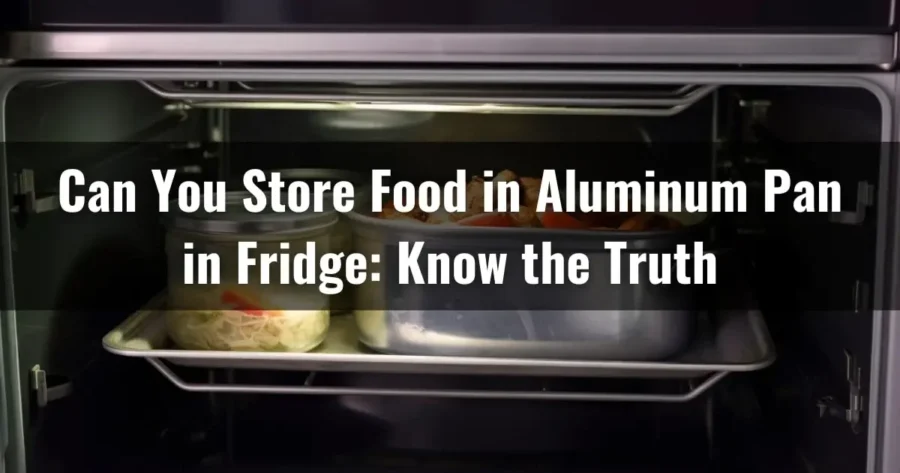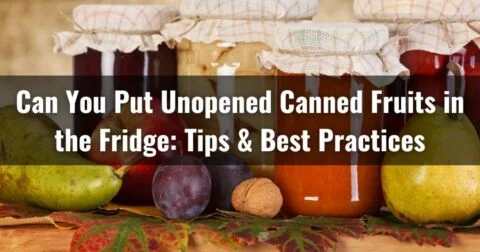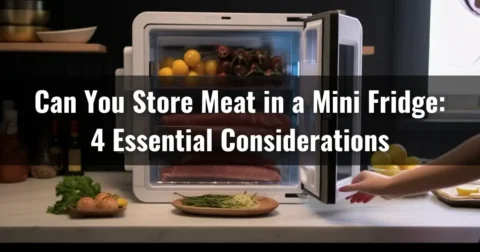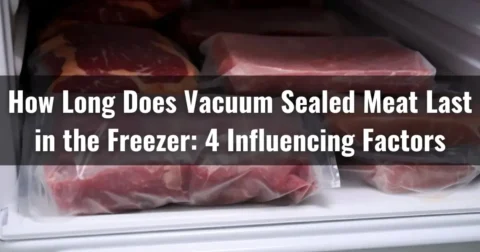Storing leftover food properly is essential to prevent foodborne illnesses. One of the most crucial aspects of food storage is selecting the right container. Aluminum pans are a common choice for cooking, but can you store food in an aluminum pan in the fridge?
You can store leftover food in aluminum pans in the refrigerator. However, you must ensure the pan has been properly cleaned and rinsed before storing any food. This helps to prevent any contamination or bacteria growth.
But if the aluminum pans aren’t coated for protection, storing food in them for a long time can lead to metal contamination. To lower this risk, it’s recommended to use aluminum pans with an enamel coating.
Throughout this article, we’ll explore the steps to properly store food in a sealed aluminum pan in your fridge. So keep reading for more information.
Jump to Section
How to Properly Store Leftover Food in an Aluminum Pan in a Fridge?
To properly store food leftovers in an aluminum pan in the fridge, there are several steps you should follow.
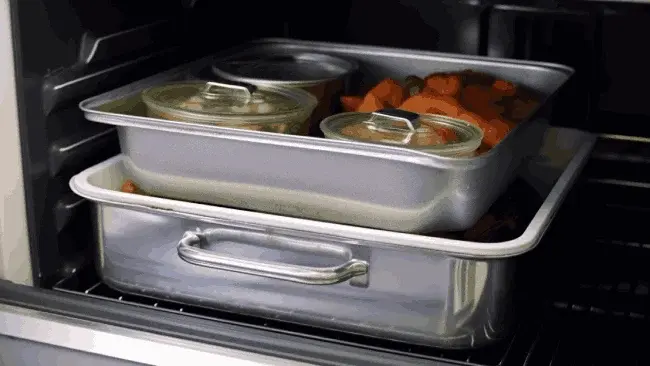
- Prepare the leftovers
- Choose an appropriate aluminum pan
- Portion the leftovers (if needed)
- Line the aluminum pan (optional)
- Transfer the leftovers
- Seal the pan
- Store in the fridge
STEP 1. Prepare the Leftovers
When hot food is placed directly in the fridge, it can raise the internal temperature, creating an environment where bacteria can thrive. Ensure you cool the leftover food down to room temperature or slightly cooler before storing it in an aluminum pan in the fridge.
STEP 2. Choose an Appropriate Aluminum Pan
Now, pick out an aluminum pan that seals tightly or can easily be covered with aluminum foil to ensure freshness and prevent spills. When choosing an appropriate aluminum pan, consider the size of your leftovers. Ensure the pan is the right size to accommodate the food you want to store.
Also, look for a pan with a secure-fitting lid or easily covered with aluminum foil. This will help to seal the freshness and prevent any spills or leaks in your fridge.
STEP 3. Portion the Leftovers (If Needed)
If you have a large amount of leftovers, you’ll want to portion them into smaller containers or aluminum pans for easier storage in the fridge. Smaller portions cool down quickly and make it easier to reheat only the needed amount, reducing food waste.
STEP 4. Line the Aluminum Pan (Optional)
To properly store your food in an aluminum pan in the fridge, you can line the pan with parchment paper or plastic wrap. The aluminum can react with acidic foods over time, so use parchment paper or plastic wrap if your leftovers are acidic.
By creating a barrier between the food and the aluminum, you can minimize the risk of any potential reactions or off-flavors. Also, lining the pan makes it easier to remove the food and clean the pan afterward.
STEP 5. Transfer the leftovers
Carefully transfer your leftovers into the aluminum pan before storing them in the fridge. When transferring the leftovers, be mindful not to overfill the pan. Leaving some space at the top allows for expansion and prevents spillage when reheating.
STEP 6. Seal the Pan
Once you have transferred your remaining food into the aluminum pan, securely seal the pan to ensure maximum freshness and prevent any air or moisture from entering.
If your aluminum pan has a tight-fitting lid, place it securely on top of it. The lid will create a barrier that helps keep the food fresh and prevents any odors from escaping.
However, if your pan has no lid, you can cover it tightly with aluminum foil. Be sure to press the foil firmly around the edges of the pan to create a tight seal. This will help protect the food from air and moisture, preventing it from drying out or becoming contaminated.
STEP 7. Store in the Fridge
When storing leftover food using an aluminum pan in the fridge, make sure that you place the pan on a stable shelf and not in the door. This is important because the temperature in the fridge door tends to fluctuate more, which can affect the quality and safety of the food.
What Can I Use to Store My Leftover Food Instead of an Aluminum Pan in the Fridge?
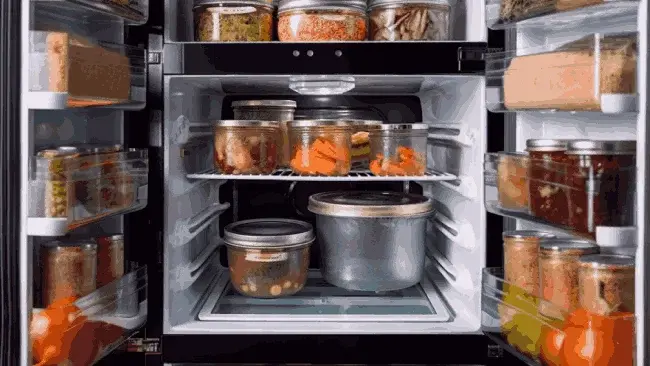
Several options are available if you’re looking for alternatives to store your leftover food in the fridge instead of using an aluminum pan.
1. Plastic Food Containers
You can use your plastic food containers instead of an aluminum pan in the fridge to store leftover food. These containers are a convenient and practical option for food storage. They’re widely available and come in various sizes and shapes, allowing you to choose the best container.
When selecting plastic containers, choose safe ones with airtight seals to keep your food fresh. These containers are specifically designed for food storage, providing a secure and hygienic environment for your leftovers.
2. Glass Containers
Glass containers have several advantages over aluminum pans when considering storing your food. They’re durable and can withstand temperature changes without warping or deteriorating. This makes them suitable for storing and reheating food in the microwave or oven.
These containers are non-porous, meaning they don’t absorb odors or stains from the food. This makes them ideal for storing various dishes without worrying about cross-contamination or lingering smells. Also, many glass containers come with airtight lids, ensuring your food remains crisp for longer.
3. Stainless Steel Containers
Stainless steel containers are a great alternative for storing your food. Not only are they durable and long-lasting, but stainless steel is also non-reactive, meaning it won’t leach harmful chemicals into your food. This makes it a safe choice for storing leftovers.
Moreover, stainless steel containers are versatile and can be used for storage and reheating. They’re oven-safe and can be used on stovetops, making them a convenient option for busy individuals.
Another advantage of stainless steel containers is that they’re eco-friendly. They’re 100% recyclable and can be reused for many years, reducing waste.
4. Reusable Silicone Food Storage Bags
Consider using silicone food storage bags as an alternative to storing your leftover food in an aluminum pan in the fridge. These reusable bags aren’t only eco-friendly but also offer several advantages.
They’re incredibly versatile and can be sealed airtight, ensuring your food stays fresh for longer periods. Silicone bags are also safe in the fridge and freezer, allowing you to conveniently store your leftovers without worrying about harmful effects.
Some silicone bag brands are microwave-safe, making them convenient for reheating food. With their durability and easy-to-clean nature, silicone food storage bags are a practical and sustainable choice for storing your leftover food.
5. Aluminum Foil
Opt for alternative food storage options like glass containers or plastic Tupperware to store your leftover food instead of an aluminum dish in the fridge. While aluminum foil can be used to wrap leftovers, it may not provide the same protection and durability as dedicated storage containers.
When using aluminum foil, ensure it’s tightly sealed to prevent air and moisture from getting in, which can lead to spoilage or freezer burn. However, it’s worth noting that storing acidic or salty foods in aluminum foil for extended periods may cause the foil to react and result in a metallic taste.
FAQ’s: Can You Store Food in Aluminum Pan in Fridge
What should I not put in an aluminum pan?
Avoid putting acidic foods in an aluminum pan, such as tomatoes, vinegar, and citrus juice while storing in a fridge. The high reactivity of aluminum with these foods can cause it to leach into the food, resulting in a metallic taste and a pitted surface on the pan.
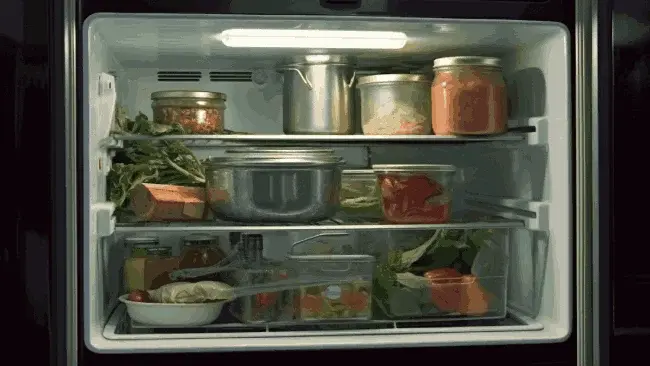
In addition to acidic foods, you should avoid cooking or storing foods with high salt content in aluminum pans. Salt can also react with aluminum, leading it to corrode and cause food contamination.
It’s best to use stainless steel or non-reactive cookware when dealing with acidic or salty ingredients. Doing so ensures your food remains safe and free from unwanted metallic tastes.
Conclusion
Storing food in aluminum pans in the fridge is an effective way to keep your leftovers fresh. As long as you follow our outlined steps, you can ensure your food stays safe and contaminant-free.
However, remember that not all aluminum pans are suitable for storing food, so always choose the right container. Properly store leftover food to ensure its freshness and minimize the risk of contamination.
With these tips, you can keep your food fresh, safe, and tasty for a long time.


